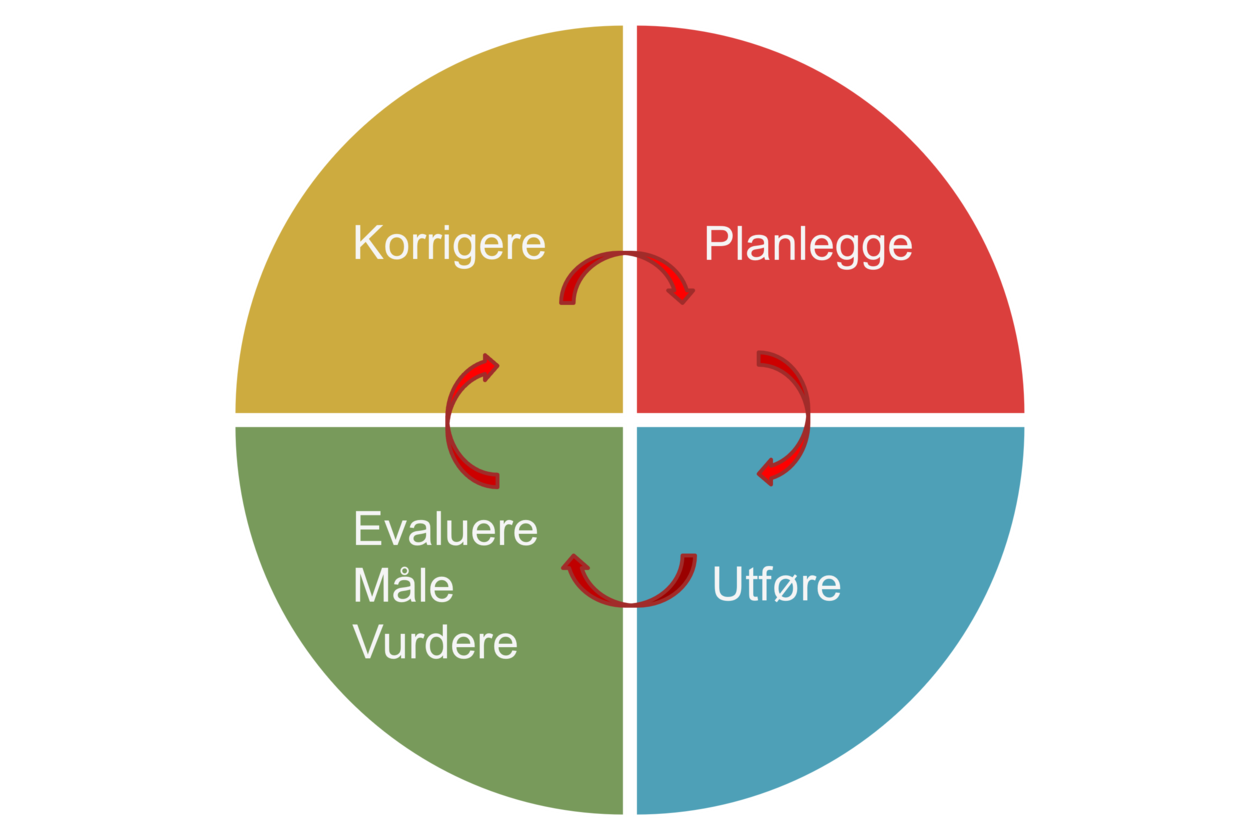System for quality assurance of the PhD education at UiB
The PhD education at the University of Bergen has its own system for quality assurance. This page is a guide for the practical and systematic quality assurance work at all levels of the PhD education.
Main content
This is an unofficial translation and is provided for information purposes only.
The system for quality assurance of the PhD education was adopted by the University board in 2017, see case 129/17.
The system for quality assurance follows a cyclic process, intended to ensure a continuous evolvement of the quality of the PhD education, and that the PhD education is in line with all rules and regulations. Quality deficiencies must be identified and met with measures for follow-up and improvement. Measures taken must be documented.
Quality assurance work in the PhD education at UiB can be illustrated as a cyclic process, where the four phases planning, performing, evaluating, measuring, assessing, and correcting are repeated within all activities and at all levels to ensure continuous improvement in quality.
Rules and responsibilities
The University Board is responsible for the PhD education and is presented with the annual PhD report (ph.d.-utdanningsmeldingen). Based on this report, they can determine whether it is necessary to put measures in place, either at individual faculties, or for the PhD education as a whole. The university management arrange dialogue meetings with each faculty to discuss the PhD education.
Each faculty has a PhD programme board that is responsible for reviewing and evaluating the need for changes in courses, the course portfolio, or the training component framework. The PhD programme board is also responsible for reviewing the faculty’s annual PhD report. If the annual candidate survey requires follow-up, each PhD programme board is responsible for putting measures in place. The same applies to the more comprehensive evaluation of the PhD programme.
The basic units/departments are responsible for activities and measures at individual levels, such as progress reporting, mid-term evaluation and follow-up or employee interviews.
The Division of Research and Innovation is responsible for coordinating the quality assurance of the PhD education at UiB.
A schematic overview of the structure, authority, and different quality assurance activities in the PhD education (in Norwegian only).
Description
The systematic quality assurance of the PhD education consists of activities that are carried out from several times a year to every six years.
Annual processes
A number of quality assurance activities are carried out each year. This includes both elements that deal directly with individual candidates’ PhD education, such as progress reporting and midway evaluation, and elements that deal with the overarching PhD education, such as the annual PhD report and the candidate survey.
Cyclic processes
A number of the quality assurance activities are carried out at different intervals, from every two to six years. This includes elements such as the evaluation of courses, program evaluation, dialogue meetings and alumni survey. One activity in the quality assurance system has not yet been implemented: the delay and withdrawal survey. This survey is planned for the coming years.
A description of each activity in the quality assurance system:
1. PhD report (Ph.d.-utdanningsmeldingen)
An annual PhD report is written, both at faculty level and for the PhD education as a whole, that gives an overview of the PhD education at UiB. Each faculty is responsible for writing a PhD report for their PhD programme. The University PhD report is written by the Division of Research and Innovation based on the faculties’ PhD reports.
The PhD report provides a basis for assessing whether it is necessary to put measures in place, either at individual faculties, or for the PhD education as a whole. The university board and the PhD programme boards are responsible for following up the central and the faculty-wise PhD reports, respectively. As part of the follow-up of the faculties PhD reports, the university management arrange dialogue meetings with the faculties.
Ph.d.-utdanningsmeldingen 2022 (in Norwegian)
Ph.d.-utdanningsmeldingen 2021 (in Norwegian)
Ph.d.-utdanningsmeldingen 2020 (in Norwegian)
Ph.d.-utdanningsmeldingen 2019 (in Norwegian)
Ph.d.-utdanningsmeldingen 2018 (in Norwegian)
2. Progress report
The progress report is an annual report from both candidate and supervisor that gives an overview of the PhD candidates’ progress. The report is intended to reveal any delays with regard to the planned progress. If the report reveals problems or delays in the candidates’ PhD education, measures must be implemented. For more information about the progress report and its questions, please see here.
The Division of Research and Innovation, in collaboration with the IT department, facilitates the survey. The candidates’ and supervisors’ answers are collected in a database and made available to the management of the faculties and institutes.
The body decided by the faculty is responsible for follow-up.
3. Midway evaluation
All PhD candidates must complete a midway evaluation halfway through their PhD education. The midway evaluation should be a summary of the candidates’ progress, ant the main purpose of the evaluation is to identify issues that entail a risk for the project to be delayed. As a main rule, the midway evaluation should include academic input from researchers other than the candidates’ supervisor within the candidate's field and/or related fields. Through the midway evaluation, the candidate should receive feedback that can improve the quality of the project. Measures must be implemented if the midway evaluation reveals problems.
The body decided by the faculty is responsible for following up.
4. Employee appraisal interviews and follow-up conversations
Employee appraisal interview
All PhD candidates employed by UiB should have an appraisal interview.
Appraisal interviews are described in UiB’s Employee Handbook. The university has developed a template for the appraisal interview for PhD candidates.
Managers shall, in consultation with the safety representative, also report annually about the scope of appraisal interviews which have been conducted at their units. This is part of the UiB’s HSE annual report (internal control) which is in turn presented to the Working Environment Committee and the University Board.
Follow-up conversations
All PhD candidates who are not employed by UiB should be offered an annual follow-up conversation. The conversation should be an arena to discuss the candidate's scientific work situation in the coming period.
The department or centre management where the PhD candidate is affiliated is responsible for conducting the follow-up conversation. A template for the follow-up conversation has been developed.
It is not mandatory for the PhD candidates to attend the follow-up conversation. The candidate’s progress report could be used as a basis for the conversation. The scope of follow-up conversations should be included in the annual PhD report.
Employee appraisal interviews and follow-up conversations was included in the quality assurance system February 2022.
5. The candidaten survey
The candidate survey is sent to all candidates after completing their degree. The survey is conducted after the doctor promotion ceremony three times a year. At the end of the year, a summary report is prepared. The candidate survey presents the PhD candidates with an opportunity to assess the PhD programme and its various elements. Results from the survey can be used to improve the quality of the PhD programme.
The Division of Research and Innovation carries out the survey, analyses the results and distribute it to the faculties. The respective PhD programme boards are responsible for deciding any follow-up, if necessary.
6. Programe evaluation
The aim of the programme evaluation is to get an external and comprehensive view of the faculty’s PhD programme. The evaluation should normally be conducted by an external committee that looks at the entire programme; information to potential applicants, admissions, measures, and the quality of the completed research, exemplified by the assessment of the thesis. The evaluation should advice on potential improvements, both in terms of completion rate and quality. UiBs PhD programmes shall be evaluated every six years at minimum.
The faculty should facilitate the evaluation and the PhD programme board is responsible for follow up.
Guidelines for programme evaluation of the PhD programmes at UiB (only in Norwegian).
7. Dialogue meetings
Dialogue meetings are arranged between central level and the faculties to ensure that there are mechanisms for feedback between the university management and the faculty. Such dialogue meetings are an arena for discussing key elements of the PhD education at each faculty. In addition, the meetings provide an opportunity for the faculties to give feedback on, and wishes for, the work done at UiB centrally. The meetings are arranged every second year between the university and faculty managements with responsibility for the PhD education.
The Division of Research and Innovation is responsible for facilitating the meetings. The Division of Research and Innovation write a short summary after the meetings that aims to raise common issues so that this can be included in the systematic quality development.
8. Course evaluation
Course evaluations show the candidates’ evaluation of individual courses at PhD level. The quality of the course, need for changes or a possible closure of the course must be evaluated every three years.
Important aspects of the course evaluation:
- A self-assessment must be carried out annually, or after each time the course has been completed if the course is not arranged annually.
- All regular PhD courses must be evaluated at least every three years, or after every third time the course has been completed if the course is not arranged annually.
- A self-assessment must be carried out, and a course evaluation can be carried out, for courses that are initially only planned to be arranged once.
- Self-assessments and course evaluations must be stored in Studiekvalitetsbasen, UiBs archive for educational notices, evaluations and other reports related to quality in studies.
The person responsible for the course is responsible for evaluating the course, carrying out an annual self-assessment, carrying out a candidate evaluation, and to analyse and follow-up the results, including proposing adjustments. The person responsible for the course must prepare a report that should be sent to the PhD programme board for review. A copy of the report can also be sent to the department and research school if applicable. The report should be published in Studiekvalitetsbasen, together with the main results from the candidates’ evaluations, and a plan for following up. The programme board is responsible for following up courses that do not work.
The head of the PhD programme board is responsible for creating a course evaluation plan, ensuring that all courses are evaluated, including a candidate evaluation, over a three-year period.
Guidelines for course evaluation (only in Norwegian).
9. Evaluation of the course portfolio
An evaluation of the faculty’s course portfolio must be carried out every three years to ensure that the faculty’s PhD courses meet the training needs in the candidates’ academic fields. If the faculty itself cannot offer PhD courses within the candidates’ academic fields, it must be assessed whether equivalent training is available at other institutions, and that the conditions for attending such courses are suitable.
The PhD programme board is responsible for the evaluation of the course portfolio. The programme board must assess whether the faculty should create new or close courses, based on the evaluation. The evaluation of the course portfolio must be stored in ePhorte.
Guidelines for the evaluation of the course portfolio (only in Norwegian).
10. Evaluation of the framework for the training component
The framework for the training component must be evaluated every three years to ensure that it is adapted to the described learning outcome of the PhD programme, as well as the rules stipulating “the training component must provide training in academic dissemination and introduction to research ethics, academic theories and methods” in the PhD regulations and “the training component shall provide training in the dissemination of results and an introduction to ethics, theory and method” in the regulations for PhD in artistic research.
The PhD programme board is responsible for ensuring that the framework for the training component is evaluated. If deviations are revealed or the training component is not adapted to the described learning outcomes of the PhD programme, a plan for follow-up must be formulated. The evaluation of the framework of the training component should be archived in ePhorte.
Guidelines for the evaluation of the framework of the training component (only in Norwegian).
11. Alumni survey
Alumni surveys can be useful for assessing to what degree the PhD education has provided the candidates with useful tools and competencies for their later career. Such a survey can be useful for collecting data about the candidates’ career after completing their PhD at UiB. The results can indicate how the PhD programmes can be improved, with regard to the candidate’s career after finishing their PhD. The survey is intended to be carried out every three years.
The Division of Research and Innovation is responsible for organizing the survey. The University board is responsible for follow-up.
PhD Alumni survey 2023 (in Norwegian)
12. Delay and withdrawal survey - coming
A delay and withdrawal survey can be useful for collecting information from candidates who are delayed or have terminated their PhD agreement. The results in such a survey can provide an overview over which elements in the PhD education that most often lead to delays or termination of the PhD agreement. It provides a basis for assessing possible measures to address these challenges. The survey is intended to be carried out every three years.
The Division of Research and Innovation is responsible for organizing the survey. The faculties must analyse the results with regard to any possible follow-up. The faculties PhD programme boards are responsible for follow-up.
The first delay and withdrawal survey is planned for 2023 or -24.
Edits
| What | When | Who |
| Employee appraisal interviews and follow-up conversations was included | February 2022 | Marie Eide |
| English translation | 10. February 2023 | Marie Eide |
| Updated guidelines for programme evaluation | 27. April 2023 | Marie Eide |
| Updated information on alumni survey | 27. April 2023 | Marie Eide |


